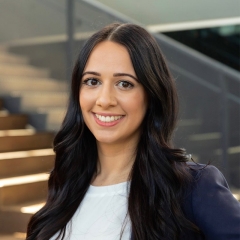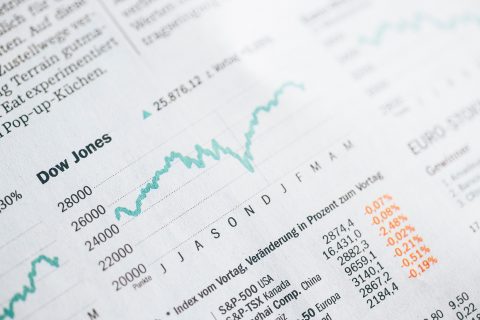Accountancy (BComm)
Virtual information sessions
Unlock the potential of business education at the John Molson School of Business with our virtual info sessions. Learn about our undergraduate programs, career prospects and what makes us unique. Designed for future business students, these sessions will give you insight into the advantages of studying at John Molson.
Why study Accountancy?
Outstanding accountants keep businesses ahead of the curve: solving problems, building sound financial strategies and ensuring good fiscal health. If you’re a high achiever with an appetite for continuous learning, consider us. You’ll join a program with a reputation for graduates who achieve excellent results at national professional accounting examinations.
By entering into a BComm with a Major in Accountancy, you build skills for good business practice, like:
- Complex problem solving
- Strategic and critical thinking
- Accounting and budgeting skills
- Quantitative skills
- How to prepare, read and analyze financial statements
- Understanding the tax system and tax planning
- Auditing theory and practice
Combine that with our hands-on Co-op program, AACSB accreditation and courses that meet the standards of Quebec’s new accountancy designation, the CPA (Chartered Professional Accountant), and there’s no question you’ll leave us with excellent career prospects.
Program highlights
- Accountancy Co-op students have interned for companies including Bombardier Aerospace, Canada Revenue Agency, KPMG, Le Chateau, Pfizer and PricewaterhouseCoopers
- Get involved in the highly engaged Accounting Students Society or participate in an Accounting Case Competition
Special funding for out-of-province students
Up to $4000 for undergraduate programs.
Program structure
Program options
A Bachelor of Commerce degree takes a minimum of three or four years (90 – 120 credits) of full-time study, depending on your academic background. All John Molson School of Business students follow a core business curriculum coupled with a John Molson School of Business major, which may be combined with a minor in another discipline or any combination of elective courses that interest them.
- Core business courses (48 credits)
- Accountancy major courses (24 credits)
- Electives (18 credits) which may include a business minor (12 credits)
Students who qualify for the Honours in Accountancy program complete a 24-credit Accountancy major plus a six-credit research-based course.
Learn more about Honours courses and program requirements.
Courses
Co-op program
The Co-op program gives you the chance to do paid work terms that last 12 to 16 weeks. Work terms make it possible for you to:
- Find the right fit in the firm or field you want to practice in
- Make key connections and network
- Apply classwork to real-world situations
- Add career experience to your resumé
During a Co-op term, you might:
- Handle personal and corporate tax files
- Conduct audits and perform inventory counts
- Do bank reconciliations
- Participate in cost-accounting dossiers
United States students: A U.S. Federal Student Aid-eligible version of this program is offered. This version meets all U.S. regulations (such as no co-operative education or e-courses) for eligible programs.
Admission criteria
Minimum cut-off averages and course requirements
- Quebec CEGEP: 27 overall, 26.5 math
- Pre-university:
- Average of 26.5 from Calculus 1 and Linear Algebra
- Applicants are eligible for admission once they have completed at least one of these two math courses. The other must be completed during the first year at Concordia.
- Strongly recommended that applicants complete both courses at CEGEP
- Professional/technical:
- Those completing a technical DEC in a business-related field may be eligible for admission.
- Students who have completed Calculus I and/or Linear Algebra must achieve an average of 26.5 in mathematics.
- Student without Calculus 1 or Linear Algebra, must have achieved a minimum of 75% in Secondary 5 Math (SN, TS or MATH 536). Your high school Quebec Achievement Record must be included with your application. If admitted, you will be required to complete all missing prerequisite courses as elective credits at John Molson.
- Additional information for CEGEP applicants
- Pre-university:
- High School: B overall, B in math
- One math from Pre-Calculus, Calculus, or equivalent
- Canadian curricula course requirements
- Accepted international qualifications
- ACT or SAT is not required
- AP exams are not required but may qualify you for advanced standing
- International Baccalaureate (IB) diploma: 29 overall, 4 HL or 5 SL math
- one math (Applications and Interpretations HL, Analysis and Approaches HL or Analysis and Approaches SL)
- International Baccalaureate Career-related Programme (CP): 29 overall, 4 HL or 5 SL math
- Baccalauréat français: 13 overall, 13 in math
- Required courses:
- Première : Spécialité mathématiques
- Terminale : Mathématiques complémentaires (Spécialité mathématiques recommended)
- Additional information for Baccalauréat français applicants
- Required courses:
- British system of education (GCE):
- A-levels: At least two A-level exams CC, C in math or
- AS-levels: At least 4 AS-level exams with equivalent results or
- BTEC: Level 3 Diploma or Extended Diploma in a related subject area with equivalent results
- Students without A-level math may be admissible based on AS-level or iGCSE/GCSE/O-Level exam results. Students should include all their exam results from iGCSE (or equivalent) onwards to support their application.
- Additional information for British System of Education (GCE) applicants
- University transfers (internal): 2.7 overall, 2.7 in math
- ECON 201, ECON 203 (or have exemptions)
- MATH 208 and MATH 209 (or have exemptions)
- Additional information on Internal Degree Transfer
- University transfer (external): B- overall, B- in math
- Courses in the disciplines of Calculus and Linear Algebra
Minimum cut-off averages should be used as indicators. The cut-off data may change depending on the applicant pool. Applicants who meet the stated minimum requirements are not guaranteed admission to these programs.
Application deadlines
It’s not too late to apply
Most undergraduate programs are still accepting applications for fall 2025.

FALL ENTRY (September)
Deadline: March 1
International applicants: Apply no later than February 1 to allow time for immigration document processing. However, applying earlier is strongly recommended. Immigration processing times vary by country, and delays could prevent you from starting your studies on time.

WINTER ENTRY (January)
Deadline: November 1
International applicants: Apply no later than August 1 to allow time for immigration document processing. However, applying earlier is strongly recommended. Immigration processing times vary by country, and delays could prevent you from starting your studies on time.
We reserve the right to close admission to a program at any time after the official deadline without prior notice.
Student story

Stephanie Radiotis
Major in Finance and Accountancy
I applied to be part of the Co-op program and it was one of the best decisions of my undergrad.

Nicolas Bergeron
Double Major in Accountancy and Management
Getting involved isn’t just about work or school. You’re also being present for purposes that mean a lot to you.
Other programs of interest

Finance is a competitive program where you acquire the skills to manage money and practice making decisions that affect the futures of corporations, communities and investors.
Department
Faculty

Supply chains make or break businesses. Companies beat the competition because they find, track and keep their products moving efficiently.
Department
Department of Supply Chain and Business Technology Management
Faculty

The main purpose of the Certificate in Accountancy is to help students who have completed a bachelor’s degree in a field other than Accountancy to complete coursework that may qualify students for entry to the Graduate Diploma in Chartered Professional Accountancy program.
Department
Faculty


